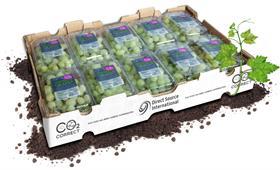
CO2 Correct, the label that indicates that the carbon impact of a piece of fruit or vegetable has been corrected, has hit the 1,000-tonne mark in its first year of existence, according to founder Stephan Schneider. “We are happy to reach this milestone, especially considering some of the setbacks we have experienced from the Covid-19 pandemic,” he says.
Despite the challenging times, Schneider reveals, CO2 Correct expects the sustainable initiative to break the 10,000-tonne barrier by the end of 2022. “In 2021, it was rather difficult to meet people to tell them about the CO2 Correct initiative,” he says. “With many events cancelled or postponed, it’s been a challenge. But despite these setbacks, we have started up some successful initiatives and have now reached our first milestone.”
With growers, importers and retailers struggling to send out a clear message about their sustainability efforts, the CO2 Correct label gives consumers exactly what they are looking for. “Consumers are looking for a simple, comforting and clear message,” says Schneider. “The CO2 Correct label signifies that the carbon impact of the product has been corrected. And it shows. The first CO2 Corrected grapes are on sale at a large Belgian retailer and have been greatly appreciated by consumers.”
Consumer research conducted by the company in Belgium proved highly encouraging, according to Schneider. “Although the CO2 Correct label had just been launched, the research found that over 65 per cent of consumers directly understood the meaning of the label,” he says. “Over 70 per cent indicated that they would like to see the initiative expanded to all types of fruit and vegetables. In addition, 75 per cent of the consumers that were questioned indicated a willingness to pay more for a sustainable product like CO2 Correct.”
When it comes to packaging, the company’s research found that 80 per cent of consumers trusted their supermarket to make the best decision when selecting more sustainable options.
“If consumers are trusting their retailer to make the right sustainable decisions, then these need to be based on real information,” says Schneider. “CO2 Correct uses the Lifecycle Analysis approach to make these insights and correct the impact. A perfect example is cardboard packaging, which can sometimes be over ten times the weight of plastic alternatives. When making the carbon calculations on cases like this, people are often shocked by the results. CO2 Correct will use its revenue to deliver more insights like this to its partners in the fruit and vegetable industry.”
According to Schneider, if companies are to go climate-neutral by 2050, then the sharing of information and knowledge will be key. “This is the only successful approach to sustainability,” he says. “Companies that share this philosophy are welcome to join our initiative.”



